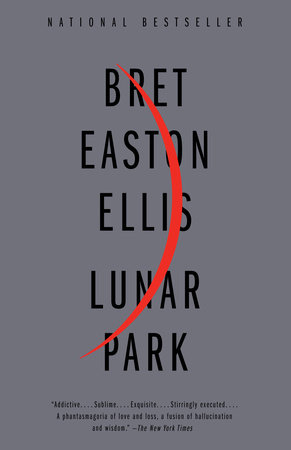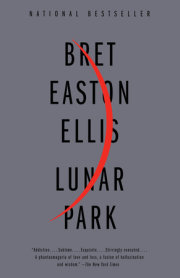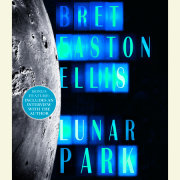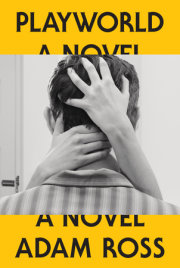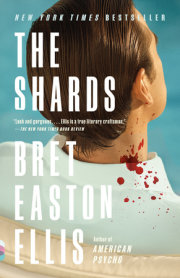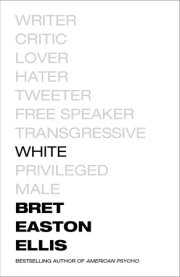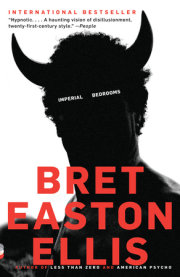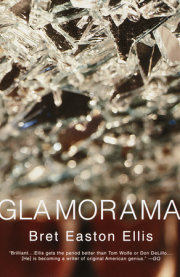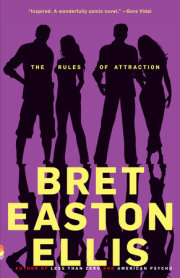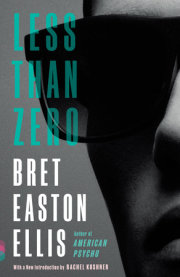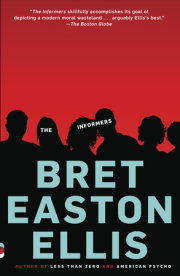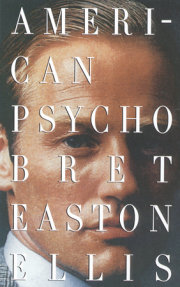Imagine becoming a best-selling novelist, and almost immediately famous and wealthy, while still in college, and before long seeing your insufferable father reduced to a bag of ashes in a safety-deposit box, while after American Psycho your celebrity drowns in a sea of vilification, booze, and drugs.
Then imagine having a second chance ten years later, as the Bret Easton Ellis of this remarkable novel is given, with a wife, children, and suburban sobriety—only to watch this new life shatter beyond recognition in a matter of days. At a fateful Halloween party he glimpses a disturbing (fictional) character driving a car identical to his late father’s, his stepdaughter’s doll violently “malfunctions,” and their house undergoes bizarre transformations both within and without. Connecting these aberrations to graver events—a series of grotesque murders that no longer seem random and the epidemic disappearance of boys his son’s age—Ellis struggles to defend his family against this escalating menace even as his wife, their therapists, and the police insist that his apprehensions are rooted instead in substance abuse and egomania.
Lunar Park confounds one expectation after another, passing through comedy and mounting horror, both psychological and supernatural, toward an astonishing resolution—about love and loss, fathers and sons—in what is surely the most powerfully original and deeply moving novel of an extraordinary career.
“We've left the confines of the realistic novel far behind . . . Lunar Park rapidly, if unexpectedly, takes on the shape of an edge-of-your-seat supernatural thriller [as Ellis] fuses black humor, the self-mockery and the raw intensity of terror into a compelling emotional roller-coaster ride.”
—Damian Kilby, The Oregonian
“[As] the Jekyll and Hyde of American fiction—genius or fiend . . . Ellis has appropriately constructed a metafictional fun house full of doubling, distorting mirrors . . . Call it a satirical horror-confessional, [but] the final shocker is that this mixed-up book not only works, but it is also creepy and compelling entertainment . . . Despite all the happenings on Elsinore Lane that are beyond belief, the very real emotional undercurrent here comes frighteningly close to justifying the author's assertion that, in some sense, every word is true.”
—Traver Kauffman, Rocky Mountain News
“A complex, densely layered book, and lying beneath its phantasmagoria is an odd, moving tenderness.”
—Michael Miller, Time Out New York
“[A] deliriously self-referential, yet curiously moving new novel . . . Ellis is up to something serious here . . . a rhapsody of grief and reconciliation.”
—New Yorker
“This eminently readable piece of metafiction blends Stephen King-style supernatural thrills with the kind of suburban angst that befits a man now in middle age . . . Lunar Park might present the strongest argument yet for Ellis as a moralist [as it] tracks closer to a truth more readers will identify with than any of Ellis's previous books.”
—Sharyn Vane, Austin-American Statesman
“Ellis's dark, piercing wit illuminates everyday moments with ironic humor [as] the narrative shifts seemlessly from scary to sweet, from disturbing to touching, from awful to beautiful.” —Ned Sears, St. Louis Today
“Unusual, hypnotic, upsetting, and memorable . . . Ellis is pushing the fictional envelope as he always has, [and] the author is at his best here, satirical without being sneering. He makes us see how truly alien (yet somehow wistful) are our obsessive attempts to keep children safe in a world in which danger, like wealth, seems to proliferate obscenely . . . Lunar Park offers a sublime meditation on mortality and nostalgia . . . a lyrical knockout.” —Meghan O'Rourke, Slate
“A breathtaking high-wire act that plays with several genres, including memoir, ghost story, and domestic drama, defying the expectations of all three while at the same time tearing the roof off the domonic inferno that underlies, and is father to, the creative process. Like American Psycho, it centers on a monster, only this time the author has named his protagonist Bret Easton Ellis.”
—Giles Blunt, Toronto Globe & Mail
“A disarmingly captivating tale [that is] an amalgam of invention and biography, and the reader must decide what really happened, and when to take the bait. . . . Lunar Park dreams up a culture of fear 'stroked' by the media, a place where truth is questionable [and] everyone is acting out the dialogue that is written for them . . . The deftness with which Ellis handles an entertaining and suspenseful plot, as well as a sophisticated play between truth and fiction, real selves and imagined selves, is impressive. Lunar Park is not only enjoyable and consuming, but insightful . . . It undeniably deserves and commands attention.”
—Christine Thomas, San Francisco Chronicle
“Ellis promptly drives straight off the narrow path and into the wilds of his imagination . . . Chucking the affectless cool that defined his narrators of the past, he gives us instead a panting, semi-hysterical version of himself, caught up in the middle of a high-camp horror film, [while] Ellis-the-author turns his acid eye on the affluent middle-aged: Ritalin edges cocaine as the most-mentioned drug, couples counseling replaces sex, and competitive parenting produces kids who trudge in despair through ‘the dull and anxious day-to-day.’ . . . There are Big Ideas here, about fathers and sons, about the responsibilities of the writer, about the interaction of imagination and reality. There is existential angst . . . But mostly there is Ellis on stage, performing an extended act of penance for the excesses of his past . . . Lunar Park is easily the most readable of Ellis’ books.”
—Janice P. Nimura, Los Angeles Times
“The guy writing Lunar Park is paying as much attention to detail as he ever did. This is what makes his book appropriately addictive . . . Then something sublime happens. Lunar Park culminates in an exquisite closing . . . a phantasmagoria of love and loss, a fusion of hallucination and wisdom . . . so stirringly executed that they beautifully illuminate all that has come before. If this is the author being carried off on a flight of the imagination, he also stirringly transports the reader . . . The book’s last words do not come from the Bret we used to know.”
—Janet Maslin, New York Times
“A phantasmagorical account of life in the suburbs and the horror that can fester in the unresolved conflicts of love and family, [Lunar Park] is also an elegy, a description of the anguish inflicted by an uncaring father, a testament to the pain of lost love and an account of the frustration of unexpressed admiration and remorse. And finally, it is an exorcism, a re-examination of Mr. Ellis's life and work.”
—Edward Wyatt, New York Times
“[While] he can still write about violence with steely, creepy, funny precision, [Lunar Park is] a book shot through with longing—with the character Ellis's sincere, hopelessly self-thwarted desire to find a link to his son and to work through his father's destructive legacy.”
—A. O. Scott, New York Times Book Review
“By combining equal parts John Cheever and Stephen King, and infusing the novel with his own, distinct brand of social satire . . . Ellis has created a potent and intoxicating cocktail, one that affords us visions without the ugly hangover.”
—E. S., Vanity Fair
“Mesmerizing . . . Fascinating . . . Gothic in tone and supernatural in conceit, [its] energy is built from its almost tabloidlike connection to real life.”
—Publishers Weekly
“[Ellis’s] most enjoyable novel . . . The story of a doomed marriage blends with a satirical take on upscale suburban angst, a campy horror story about a haunted house, a Frankenstein-like case of a monster unchained and a serious rumination on the damage fathers can do to sons. Ellis stirs these elements into a steamy witches’ brew and works his way through to a marvelously elegiac ending, displaying real artistic discipline . . . Even his harshest critics may now have to acknowledge that this versatile, resourceful writer has formidable skills.”
—Kirkus

